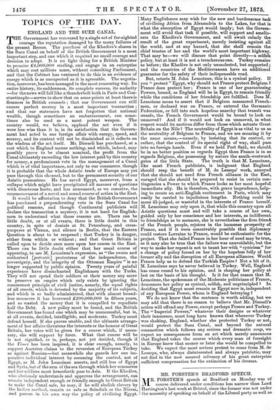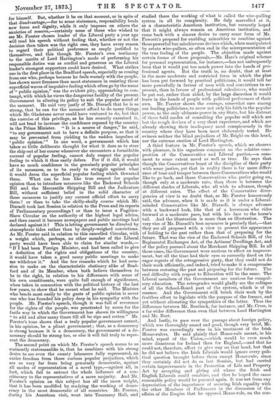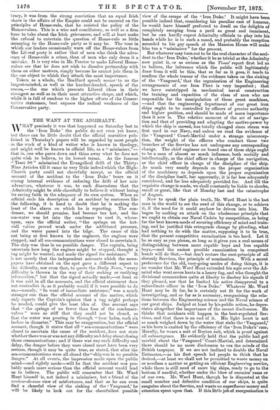MR. FORSTER'S BRADFORD SPEECH.
MR. FORSTER'S speech at Bradford on Monday was of course delivered under conditions less narrow than Lord Hartington's last week at Bristol, since the former was not under the necessity of speaking on behalf of the Liberal party as well as
for himself. But, whether it be on that account, or in spite of that disadvantage,—for to some statesmen, responsibility lends new force and dignity, while it only imposes on others the anxieties of reserve,—certainly none of those who wished to see Mr. Forster chosen leader of the Liberal party a year ago will read his speech without feeling that, whether or not the decision then taken was the right one, they have every reason to regard their political preference as amply justified to themselves, and this though Mr. Forster's own testimony to the merits of Lord Hartington's mode of performing his responsible duties was as cordial and generous as the Liberal leader's strongest supporters could have desired. What strikes one in the first place in the Bradford speech, especially as coming from one who perhaps because he feels warmly with the people, has shown more firmness than most statesmen in resisting those superficial waves of impulsive feeling which often go by the name of " public opinion," was the evident pity, approaching to con- tempt, with which he views the dangerous facility of the present Government in altering its policy to suit the popular mood of the moment. He said very justly of Mr. Disraeli that he is so strong, that he can for the moment afford to do many things which Mr. Gladstone never could have ventured to do, but that the exercise of this privilege, as he has recently exercised it, will not tend to increase the confidence reposed by the country in the Prime Minister. " It is a source of danger," he said, "to any government not to have a definite purpose, so that it may be prevented from yielding to the sudden impulses of ' public opinion." In one word, a government which has taken so little deliberate thought for what it does as to steer the ship out of her course whenever she encounters a formidable current of popular feeling, cannot duly respect the popular feeling to which it thus easily defers. For if it did, it would have so much confidence in the genuinely popular principles of its measures, as to be ready to struggle against what it would deem the superficial popular feeling which thwarted them. What can be less like true respect for popular opinion than to introduce measures like the Endowed Schools Bill and the Mercantile Shipping Bill and the Judicature Bill, without sufficient belief in the solid character of these measures to justify any earnest official effort to carry them ? or than to take the shilly-shally coarse which Mr. Disraeli took last Session in relation to the Press and its reports of Parliamentary proceedings ? or than to issue a Fugitive- Slave Circular on the authority of the highest legal advice, and then cancel it because newspapers and public meetings had declared against it ? This is letting government be directed by atmospheric tides rather than by deeply-weighed convictions. As Mr. Forster said in relation to this cancelled Circular, with a weight which, perhaps, no other member of the Liberal party would have been able to claim for similar words,— " If I had been Foreign Minister, and had been called to give a definition of the rights and obligations of the country, it would have taken a good many public meetings to make me withdraw it." And the few remarks which he had occa- sion to make on the characteristic obstinacy alike of Brad- ford and of its Member, when both believe themselves to be in the right, in relation to his differences with some of his own constituents, were quite full enough of significance, when taken in connection with the political history of the last few years, to show that he meant what he said. The Minister who bends most easily to the gusts of public opinion is never one who has founded his policy deep in his sympathy with the people. Mr. Forster's speech, though it was full of reverence for the rights of the people, was penetrated by scorn for the facile way in which the Government has shown its willingness " to add and alter many times till all be ripe and rotten." Mr. Forster's tone shows that a truly popular government cannot, in his opinion, be a pliant government ; that, as a democracy is strong because it is a democracy, the government of a de- mocracy should be strong too, or else it will fail truly to repre- sent the democracy.
The second point on which Mr. Forster's speech seems to us eminently statesmanlike is, that he combines with his strong desire to see even the county labourers fully represented, an entire freedom from those curious popular prejudices, which are so very far from being genuinely democratic, against all modes of representation of a novel type,—against all, in fact, which fail to entrust the whole influence of a con- stituency to the representatives of a mere majority. And Mr. Forster's opinion on this subject has all the more weight, that it has been modified by studying the working of demo- cracy in the most democratic of all countries. Mr. Forster, during his American visit, went into Tammany Hall, and studied there the working of what is called the wire-pulling system in all its complexity. He duly marvelled at it, as a characteristic American institution, but earnestly hoped that it might always remain an American institution, and came back with a sincere desire to carry some form of Mr. Fawcett's proposal for enabling minorities to combine against those powerful but mischievous devices which, when manipulated by astute wire-pullers, so often end in the misrepresentation of the true feeling of the people. The objection made against certain forms of these proposals,—Mr. Hare's original scheme for personal representation, for instance,—has not unfrequently been that it would put too much power into the hands of pro- fessional agents. But the truth is, no doubt, that at least in the more moderate and restricted form in which the plan has been put forward by practical politicians, it would tell far more powerfully in favour of men with real convictions to re- present, than in favour of professional calculators, who would be put out, rather than aided, by the large discretion it would leave in the hands of people with political preferences of their own. Mr. Forster shows the courage, somewhat rare among our leading politicians, to avow not only his faith in the popular power, as the only ultimate power in any State, but his distrust of those bald modes of consulting the popular will which are but the rough devices of a very short experience, and which are already showing their inadequacy most conspicuously in the country where they have been most elaborately tested. He evinces neither the blind prejudices of Mr. Bright on this head, nor the extreme caution of Lord Hartington.
A third feature in Mr. Forster's speech, which we observe with pleasure, is his sagacious comment on the relative com- position of the Conservative and Liberal parties,—a com- ment to some extent novel as well as true. He says that though the Conservatives boast of the discipline of their party with some justice, yet that in reality there is far more differ- ence of tone and temper between those Conservatives who would like to go back, and those Conservatives who prefer going on, though only at a moderate rate, than there is between the different shades of Liberals, who all wish to advance, though at different rates. The effect of the Conservative diver- gencies of view is no doubt that, as Mr. Forster humorously said, the advance, when it is made as it is under a Liberal- minded Conservative like Mr. Disraeli, is always advance with a backward look, like that of a horseman who rides forward at a moderate pace, but with his face to the horse's tail. And the illustration is more than an illustration. The very vice of Mr. Disraeli's best measures is precisely that,—that they are all proposed with a view to present the appearance of holding to the past rather than that of preparing for the future. That was the vice of the Endowed Schools Bill, of the Regimental Exchanges Act, of the Artisans' Dwellings Act, and of the policy pursued about the Merchant Shipping Bill. In all these cases, the Government were anxious to effect an improve- ment, but all the time had their eyes so earnestly fixed on the eager regrets of the retrogressive party, that they could not do their work efficiently, and indeed, tried to make it a compromise between restoring the past and preparing for the future. The real difficulty with respect to Education will be the same. The Liberal members of the Government are anxious for compul- sory education. The retrogrades would gladly see the collapse of all the School-Board part of the system, which is of its essence. And the Government will botch their work by the fruitless effort to legislate with the purpose of the former, and yet without alienating the sympathies of the latter. Thus the difference between Mr. Bentinck, for instance, and Mr. Cross, is a far wider difference than even that between Lord Harlington and Mr. Burt.
And lastly, to pass over the passage about foreign policy, which was thoroughly sound and good, though very brief, Mr. Forster was exceedingly wise in his treatment of the Irish Home-rulers. He said plainly that Home-rule meant, in his mind, repeal of the Union,—which would be even much more disastrous for Ireland than for England,—and that he could not, therefore, affect to give way on that head, but that he did not believe the Irish Liberals would ignore every poli- tical question brought before them except Home-rule, since they certainly did not do so last Session, but had carried certain improvements in the Protection of Life and Property Act by accepting and giving aid where the Irish and English Liberals could combine, and that he hoped the same
reasonable policy would be pursued again. It was not from any depreciation of the importance of securing Irish equality with the other Members of Parliament in the discussion of the affairs of the Empire that he opposed Home-rule, on the cow. Crary, it was from the strong conviction that an equal Irish share in the affairs of the Empire could not be ensured on the principles of Home-rule, that he resisted the policy of the Home-rulers. This is a wise and conciliatory, as well as a firm -tone to take about the Irish grievances, and will at least make the •refusal to entertain the question of Home-rule as little annoying to the Home-rule party as it may be. The tone in which our leaders occasionally warn off the Home-rulers from the Liberal party is rather that of men who think the advo- icacy of Home-rule a crime, than of men who only deem it a -mistake. It is very wise in Mr. Forster to make Liberal Home- ,rulers, see that he does not wish to dissolve partnership with -them on other matters, simply because he cannot join them in the one object to which they attach the most importance.
Taken as a whole, the Bradford speech seems • to us the largest-minded, as well as the hardest-headed, speech of the recess,—the one which presents Liberal ideas in their -strongest ae.wellas in.their most attractive shape, and which, while it is full of candour to the higher efforts of the Conser- vative statesmen, best exposes the radical weakness of the -Conservative party.




































 Previous page
Previous page